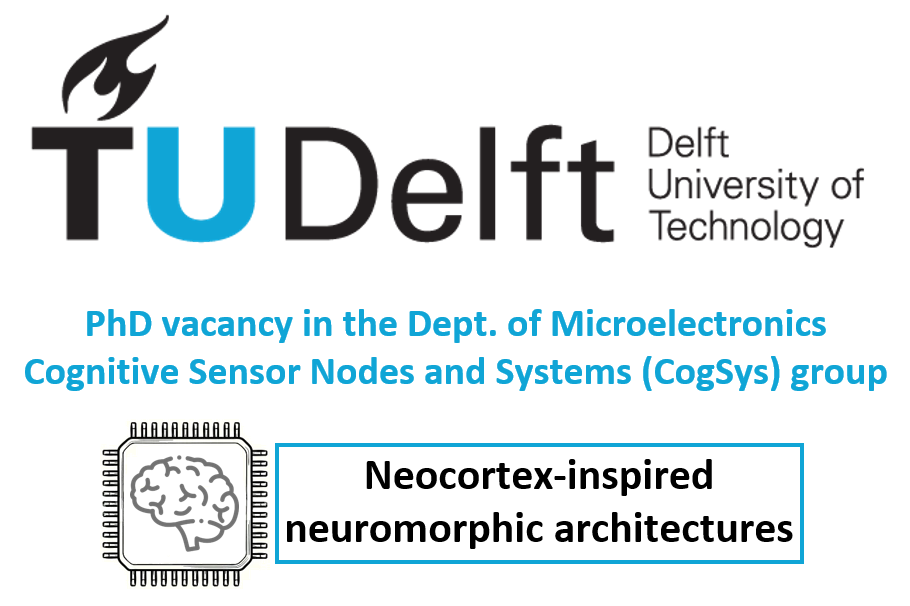Openings at ME
PhD position - Design of Emerging Neuromorphic Architectures Based on the Human Neocortex
Opening for: PhD studentStatus details
| Status: | Open |
|---|---|
| Announced: | 27 Apr 2024 |
| Closing date: | 26 Jun 2024 |
| Duration: | 4 years |
The field of neuromorphic engineering aims at replicating the brain’s key organizing principles in custom silicon toward order-of-magnitude efficiency improvements compared to current processor architectures. Based on this promise, neuromorphic engineering is now included in worldwide research roadmaps, has seen a x10 increase in yearly research output over the last decade, and fuels interest from large industrial players as well as a flourishing landscape of new startups. However, the field has not yet matured and still misses an actionable framework to deliver on its promises [1].
In this PhD project, you will directly contribute to tackling this challenge by taking inspiration from key neuroscience insight. To do so, you will look into the brain's computational primitives at an abstraction level that is higher than individual neurons and synapses, one prominent example of which are the cortical minicolumns [2,3]. You will thus
- translate neuroscience observation into an emerging neuromorphic computer architecture,
- minimize its energy and area footprints through hardware-algorithm co-design,
- implement and tape out low-power digital (and/or mixed-signal) integrated circuits based on this architecture,
- investigate the deployment of this prototype in key edge-computing use cases, such as smart prostheses that can adapt to the patient.
You will thus pave the way to next-generation small- to large-scale neuromorphic architectures inspired by the human neocortex, targeting low-footprint adaptive devices such as personal health monitoring wearables and robotic agents.
[1] C. Frenkel and G. Indiveri, "Bottom-up and top-down approaches for the design of neuromorphic processing systems: Tradeoffs and synergies between natural and artificial intelligence," Proceedings of the IEEE, vol. 111, no. 6, pp. 623-652, 2023.
[2] D. P. Buxhoeveden and M. F. Casanova, "The minicolumn hypothesis in neuroscience," Brain, vol. 125, no. 5, pp. 935-951, 2002.
[3] T. Schwalger, M. Deger and W. Gerstner, "Towards a theory of cortical columns: From spiking neurons to interacting neural populations of finite size," PLoS Computational Biology, vol. 13, no. 4, p. e1005507, 2017.
About the Department of Microelectronics at TU Delft: https://microelectronics.tudelft.nl/
About the PI: https://microelectronics.tudelft.nl/People/bio.php?id=822
About the Cognitive Sensors Nodes and Systems (CogSys) lab: http://cogsys.tudelft.nl
Requirements
We are looking for an enthusiastic Ph.D. candidate with a background in electrical engineering, computer architecture, or similar fields. Experience with designing multi-core digital systems *or* mixed-signal integrated circuits is a strong plus.
You are genuinely curious and passionate about the brain, while you enjoy learning beyond your comfort zone. Beyond your electrical engineering / computer architecture background, you have a keen interest to expand your expertise in the areas of machine learning and neuroscience (previous exposure in these areas is a plus). While you can take initiative, you are also a team player in order to make the best of interdisciplinary collaborations in a research team.
You have an outstanding motivation but are unsure whether you meet these requirements? Unconventional backgrounds are welcome; you are still encouraged to apply (see application procedure hereafter, ensure your cover letter is written accordingly and highlights how you plan to overcome any gap).
Doing a PhD at TU Delft requires an MSc degree, as well as English proficiency at a certain level to ensure that the candidate is able to communicate and interact well, participate in English-taught Doctoral Education courses, and write scientific articles and a final thesis. For more details please check the Graduate Schools Admission Requirements.
Are you interested in this vacancy? Please apply via via this link and upload:
- a cover letter stating your background, motivation, and fit for the position (max. 1 page);
- a detailed curriculum vitae (incl. a list of publications, if any);
- the name, affiliation, and e-mail address of two references, incl. the MSc thesis supervisor(s), who are ready to submit a support letter upon request;
- transcripts for your BSc and MSc;
- a short summary of your MSc thesis (max. 1 page).
The position is open until filled. Applications will be reviewed on a monthly basis. The preferred starting date is in September/October 2024 (flexibility for a starting date delayed by a few months might be accommodated).
Contact
dr. Charlotte Frenkel
Assistant Professor
Electronic Instrumentation Group
Department of Microelectronics
More information
Additional information
In The Netherlands, almost all PhD positions are linked to funded research projects. This has several implications:- PhD students are employed: they receive a salary rather than a grant. Most projects have a duration of 4 years.
- Positions become available once a project is funded. This can happen at any time during the year.
- It typically takes 6 to 9 months for a project proposal to receive funding. In this period, a position may be anticipated but the outcome remains insecure. Once a project is funded, the open position needs to be filled as soon as possible.
If you are interested in our research, it merits to inquire whether openings will be available. We collect resumes of prospective PhD students throughout the year, for each of our research tracks.
General requirements
We make our selection based on the following general requirements:- Formal requirements regarding prior education: you should have earned an MSc degree at a recognized institute for higher education.
- Background: you should have a background that fits the requirements of the project
- Excellence: your Grade-Point-Average should be above 8 (10). Also your MSc thesis should have received a grade above 8 (10).
- English: you should be able to communicate well in english (written and oral). Provide TOEFL/IELTS scores if available.
- Originality: your MSc thesis or later work (publications) should reflect some original ideas. Critical and independent thinking is very important.
- Team player: you should be able to work well in a team of other project members.
